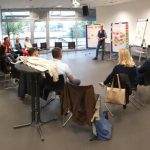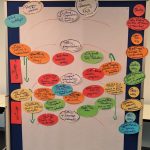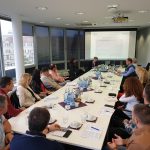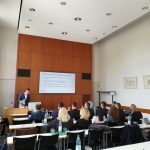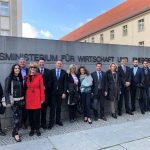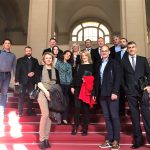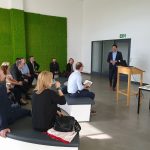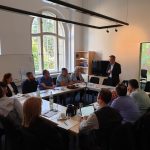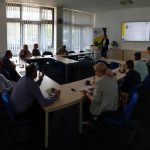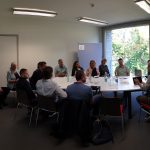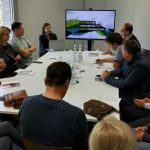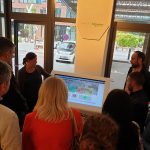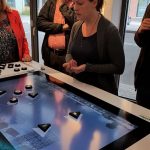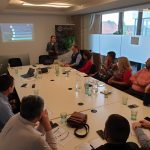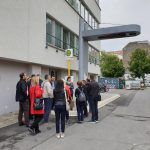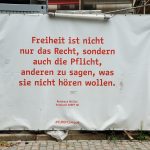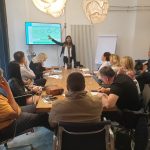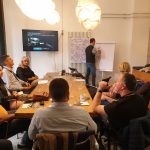As part of promotion of systemic approach in implementation of the Small Business Act in BiH, a study visit to Berlin was organized, focused on the promotion of quality, innovation and green economy, in the period September 9-13th 2019. Representatives of the Ministry of Foreign Trade and Economic Relations of BiH, the RS Ministry of Economy and Entrepreneurship, the Ministry of Development, Entrepreneurship and Crafts of the Federation of BiH, the Government of the Brcko District of BiH – Department for Economic Development, Sport and Culture, the RS Ministry for Scientific and Technological Development, Higher Education and Information Society, as well as the Ministry of Education and Science of the Federation of BiH participated in the visit.
The study visit was focused on the following questions / challenges:
- What is needed to create policies which would promote networking and knowledge sharing between supporting organizations and businesses,
- What is the role of supporting organizations in promoting specific activities with the private sector,
- How to promote stronger business orientation within existing supporting organizations to strengthen innovation, green development and enforcement of quality and standardization conditions for local and international markets,
- How to encourage SMEs to be innovative,
- How to promote green SMEs and start-up innovations.
The answers to these questions were sought in a visit and discussion with representatives of the following institutions and organizations:
- the VDI / VDE Innovation + Technik GmbH – one of the leading innovation service providers in Germany promoting technological business development, clusters and value chains in the country. Their main task is to promote the German innovation system overall. VDI/VDE has a bridging role, being responsible for putting policies e.g. from the Federal Ministry of Economy and Energy (BMWI) and the Federal Ministry of Education and Research (BMBF) into support programs and tendering procedures.
- the Federal Ministry of Economic Affairs and Energy – In 2011 the German Government decided to step out of nuclear power supply in the upcoming years. It includes the decision to change from nuclear and carbon-based energy supply towards a renewable energy supply and a strengthening energy efficiency. The government had set the policy target to reach 80% of power supply from renewable energy sources in 2050 (in 2012 around 20%). The implementation requires a major policy shift that also puts local municipalities, regions, companies and private households under pressure to change their traditional ways of consumption and production. The Federal Ministry of Economic Affairs and Energy is the main responsible Ministry to implement this transformation.
- the WindNODE-Projektmanagement – Technical University Berlin – The WindNODE project is part of the BMWI support program „Smart Energy Showcases – Digital Agenda for the Energy Transition (SINTEG)“ The program aims to set up large-scale showcase regions for developing and demonstrating model solutions that can deliver a secure, efficient and environmentally compatible energy supply with electricity being generated to a large extent from volatile sources such as wind or solar. The WindNODE project or showcase is one of the 5 regional showcase projects with different focal areas. It aims to efficiently combine renewable energy generation, electricity grids and energy users through digital networking.
- Economic Development Agency (EDA) Potsdam – The visit in Potsdam was focused on innovation promotion from a perspective of a prosperous city which was successful to manage the structural and political change from a communist science-based and large state owned business‐based structure to an applied research and SME related network structure. Expertise in specific industries has been created by the interplay of science and research. It gives the city a future-oriented profile as a site for film and media, software and IT, Life Science and health management.
- EUREF Campus – it is regarded as an innovative future location and real laboratory of the energy revolution. Opened 10 years ago, more than 3,500 people are now working around the former power station and the Gasometer in more than 150 companies, institutions and start-ups. Visit has tackled the questions of how to promote required knowledge, research and start-up capacities for green economic development;
- the Borderstep Institute for Innovation and Sustainability – it is an independent applied science think tank focused on entrepreneurial solutions to global challenges. It studies how innovation and entrepreneurship contribute to sustainable development and how to successfully shape the transformation process on the way to a green economy. Borderstep places a strong emphasis on three specific fields of action and technology that are of fundamental significance to sustainable forms of economic activity: climate change, smart energy, digitalization & green IT. The visit also provided an overview of projects supported by the Borderstep.
The participants expressed great satisfaction with the opportunity to participate in the study visit, as well as with useful insights that will be useful for their future work.
The project “European Small Business Act as a framework of SME strategies and policies in BiH – SBA in BiH” is funded by Sida through the Embassy of Sweden in Bosnia and Herzegovina.









